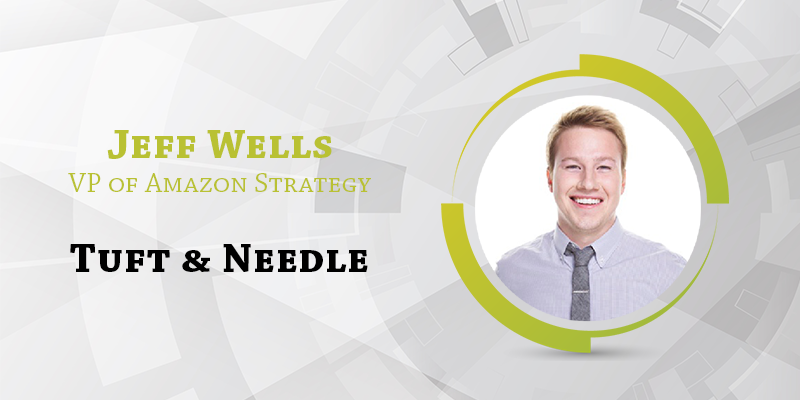An Interview with Jeff Wells of Tuft & Needle

Jeff Wells is a jack-of-all-trades, technologist and young executive serving as Vice President of Amazon Strategy at Tuft & Needle, leading a disruptive 8-figure line of business in the mattress industry. Upon joining the company in 2014 as the first software engineer, Jeff single-handedly prototyped dozens of automated infrastructure tools which Tuft & Needle still utilizes to this day in order to streamline hundreds of millions of dollars worth of e-commerce transactions and shipments. Jeff then transitioned to the Supply Chain team to seamlessly scale production 5X within a year, opening new facilities and all but eliminating manufacturing defects. Jeff was accepted into the prestigious Y Combinator startup incubator’s Winter 2014 Batch, which he declined to help build T&N — and hasn’t looked back since. He earned a BA in Computer Science from the Barrett, The Honors College at the Arizona State University. During his undergraduate studies, Jeff founded a 501(c)3 non-profit organization, providing business consulting and micro-loans to low-income entrepreneurs.
Please tell me your story. How did you get your start?
I always knew I wanted to work at a startup. During college, I taught myself to code because all the startups I looked at were software companies hiring software engineers. I started working as the second employee at Tuft & Needle as a software engineer. Since then, the company has grown to 150 employees and over $100M in revenue. I grew with the company, serving many roles across software, analytics, supply chain, and even performed some of the human resource functions.
What are the three Leadership Principles that you have discovered and executed that have contributed to your success?
- Something will only get done if there is an “owner” for it. A lot of decisions are made but if no one is made responsible for implementing them, they will fall flat.
- Don’t decide what to do first, decide what not to do at all. It’s easy to think you can get to it all, but it’s not realistic. There’s only time to get to some things, so make sure you do the important ones.
- Automate the boring and repetitive stuff, and focus on new ideas that create value.
What are you most proud of?
I’m most proud of the growth of Tuft & Needle into a mature company and having played a part in it.
What are your favorite questions to ask those you lead?
“Do you think this is a good idea?” I come up with ideas all the time, but never move forward with them without the input and approval from my team.
What has been your greatest failure? And what did you learn from it?
I started a SaaS business that failed after a year of hard work developing it. I learned a ton in the process, but the most important thing was to see if you can sell a product before spending the time to build it. In this case, it was easier for me to build it first and keep thinking to myself that once it is fully done people will buy it. Often, it’s better to do the hardest thing first (for me, that’s selling).
Can you please share about “Execution?” What do you do to insure that your Strategic Plans actually become reality?
To execute on an initiative, I break it down into small pieces and implement one at a time. I make sure that every marginal step we take produces real value such that if we were to stop there, we still created value. A lot of projects run into trouble because they won’t provide value unless the whole package is complete. Priorities often change and projects will go unfinished, but that won’t matter if each step is valuable by itself.
What are the keys to developing the next generation of leaders in your world?
Following the rules and doing a good job are no longer enough in today’s world. Developing leaders are those that are willing to break the rules, question the norm, and think for themselves.
How do you continually deepen your personal relationships with your clients/customers/staff/peers/leaders?
I have found getting out of the office for lunch, dinner, or drinks to be the most effective. I often take clients or vendors out to dinner and get to know them on a more personal level. Everyone has a real full life outside of work and that often goes unrecognized in daily workplace discussion.
What questions are you asking yourself lately?
Is what I am doing the highest and best use of my time? What could I be doing that really “changes the game”?
What do you do to break from the everyday hustle of work?
My ultimate relaxation is getting beers with friends at a brewery outside.
Jeff Wells presented at the MCOR Leadership Boot Camp on the topic of ‘Empowering an Unstoppable Team’.
Learn more about the Leadership Boot Camp
